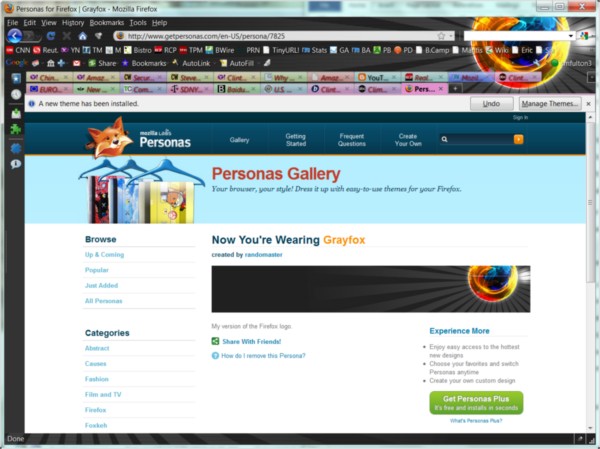
Microsoft, don't give up on Steve Ballmer just yet
Ten years ago last week -- Jan. 14, 2000 -- Steve Ballmer took over the chief executive's position as Bill Gates stepped back to be Microsoft chairman and chief software architect. Ballmer has officially entered his second decade as Microsoft's CEO. There are fairly constant complaints about Microsoft's performance under his leadership.
NBC is sending Conan O'Brien packing; today ends his seven-month career as "The Tonight Show" host. Should Microsoft do something similar -- remove Ballmer and replace him with someone else, even Gates in a move like Jay Leno coming back and replacing O'Brien? I expect that many commenters to this post will answer "YES!" to that question. But I wouldn't give up on Ballmer just yet.

Data encryption tool maker: Antivirus has become ineffective
The following commentary is by Mark Smail, the CTO of Onix International, which distributes a data encryption tool called EncryptStick, designed to work with USB thumb drives. This is not an advertisement; Betanews is merely presenting Mr. Smail's point of view.
Consumers are growing increasingly comfortable storing sensitive information on their computers, USB flash drives, and external hard drives, as well as using Web-based solutions to automate regular tasks such as shopping for holiday gifts, paying bills, and tracking financial portfolios. The push from vendors encouraging their customers to move toward e-billing has also played a major role in more personal information being stored locally on personal computers.

Apple tablet could give ARM the lion's share of UMPC architectures
Convergence in computing is an exciting trend to watch, and as our devices improve, they start to take on the characteristics of each other. Our mobile PCs are getting lighter, flatter, and more touchable with better perpetual connections; and our mobile phone screens are getting bigger, their processors are getting more powerful, and they're interacting with the many of the same services we use on our PCs.
Even if the mystery Apple product next week doesn't look exactly like a "big iPhone," the fact that many people already assume that's what it will be, is a sign of the strong current of convergence in consumer electronics.

Google's deal with the devil: Declaring war in China while competitors wimp out
I was just old enough to remember, and appreciate the significance of, the Tiananmen Square Massacre in 1989. The iconic image of a dissident standing defiantly in front of a column of People's Liberation Army tanks is as powerful today as it was when we first saw it.
Back then, activists fighting for greater freedom used surreptitiously acquired fax machines to get the word out to the rest of the world. It was an early sign that technology held the potential to undercut control-freak-government efforts to stifle free speech. Now that the Internet has taken over as the platform of choice for Chinese freedom-lovers and freedom-crushers alike, the battleground has shifted irrevocably, and the autocratic Chinese government hardly has enough political officers to keep its spy game machinery in balance.

EU clears Oracle + Sun: If MySQL fails, there's always PostgreSQL
In green-lighting Oracle's proposed acquisition of Sun Microsystems today, the European Commission says it considered whether in doing so, Oracle would effectively eliminate the "competitive constraint" of competition from the open source field by way of MySQL, the open source relational database that Sun acquired in 2008. That acquisition gave Sun its first competitive database product; but Oracle already has one of the leading commercial entries.
The conclusion the Commission reached today is a surprising one, especially from Competition Commissioner Neelie Kroes just days before a planned Commission-wide job swap. Kroes had been seen as a protector of the interests of open source alternatives as a plurality. But in today's decision, the EC implied that the open source field only needed one active competitor to be relevant. If that competitor for some reason stops being MySQL, it announced, then PostgreSQL can step in and fill its shoes.

Security report: Web users pick passwords that are way too easy to hack
According to a report on Consumer Password Best Practices culled from an analysis of 32 million passwords exposed in the recent Rockyou.com Web security breach, the three most commonly used passwords among users of the Rockyou social networking site turned out to be 123456, 12345, and 123456789.
Also making in into the top ten, in this order, were the following: Password, iloveyou, princess, rockyou, 1234567, 12345678, and abc123.

Newly released Windows fix addresses both new and old IE browsers
Over the past few days, security engineers have warned that variations of the publicly-released Hydraq exploit are being engineered for later versions of Internet Explorer than the one targeted in the recently discovered wave of attacks against Google and others, IE6. One security researcher on the "good side," Dino Dai Zovi, claimed on Twitter earlier today he has a functional derivative of Hydraq for IE7 and IE8...kind of. To make them work, two of Windows 7's more celebrated security features -- Address Space Load Randomization and Data Execution Prevention -- have to be manually turned off first.
Still, the nearness of such an exploit to reality prompted Microsoft to release its out-of-band security update today, as promised yesterday, for IE6, IE7, and IE8. Separate update packages are currently being deployed through Windows Update, and are available for download now.

Firefox 3.6 RTM officially released, includes personalization
Download Mozilla Firefox 3.6 for Windows from Fileforum now.
It's been said that improvements to Web browsers aren't truly improvements unless the user can both see and feel them. Mozilla's latest efforts in that area have just been finalized: a new stable version of Firefox that not only provides more control features to the new Windows 7 taskbar, but lets you paste posters on its wall.

Baidu: Register.com helped 'Iranian Cyber Army' commit criminal trespass
Leading China search engine Baidu's lawsuit against US domain registrar and ISP Register.com, filed yesterday, was not at all what analysts, especially in the British press, expected it to be: There's no evidence, including in the context of its many redacted paragraphs, of any sort of "retaliation" whatsoever against Google's new public stance against China in the wake of attacks against it that it claims emanated from China. Although diplomats from both countries may continue to play the Baidu case as another volley in a brewing trade dispute, from Baidu's perspective, that's not what it is at all.
Baidu's grievance is specifically against Register.com, not the country it's in; and it would probably have filed this very lawsuit had the Google attack never happened. The public portions of the initial complaint, released by US District Court in New York this morning, accuse Register.com not only of negligence in allowing its DNS records to be hacked, and Baidu traffic diverted to a Web site purportedly from the "Iranian Cyber Army" (which may not even be Iranian). Baidu goes so far as to say that Register.com "aided and abetted" whoever produces that Web site, whom Baidu refers to as the "Imposter," in the commission of what Baidu describes as trespass upon its property. Evidence of the Imposter's true identity and/or whereabouts may, based on Betanews' reading of the complaint, could very well appear within those redacted paragraphs.

Beta of Amazon Kindle SDK presents unique problems to software makers
If you're selling a broadband-connected device these days, it's almost required to have a platform for application development that goes along with it. The mobile phone space is overrun with different development options, heck, even networked printers have got one now.
Amazon is about to see if the Kindle e-book reader is a viable platform for third-party apps.

Windows Mobile 6.5 upgrades hit T-Mobile today
When Windows Mobile 6.5 launched four months ago Microsoft listed eight Windows Mobile 6.1 devices that would be upgradeable to 6.5. Unfortunately, at the time they were all listed as "date not yet available."
Today, T-Mobile announced that the Windows Mobile 6.5 upgrades are available now for the HTC Touch Pro2 and HTC Dash 3G (a.k.a., HTC Rhodium).
YouTube Rental 'beta' launches this Friday
In the official YouTube blog today, the popular Google-owned video sharing service announced it will be launching a streaming rental service on Friday in partnership with the Sundance Film Festival.
It will only include a handful of movies (five from Sundance 2009-2010, and "a small collection" from other US partners across different industries) that will be available to rent until Sunday, January 31.

Google: We're ready for a dialogue with China
This afternoon, just hours following Microsoft's stunningly fast response to a critical Internet Explorer vulnerability made stunningly public by Google last week, a Google spokesperson told Betanews today that it expects to engage in a dialogue with the government of China within the next few weeks. The subject will be the status of its business relationship with that country, following Google's allegations that a recent attack on its servers originated in China.
Whether Google will take the next step -- specifically, discussing the substance of these talks with the US government -- is something the company may not yet have considered, judging from the response to our question from Google's spokesperson today.

5 reasons why or why not Apple should Bing
It seems like everybody who is anybody, or nobody, is speculating that an Apple-Google schism is inevitable. In vogue this week: Punditry about Apple and Microsoft entering into an unholy search alliance. Overnight, Business Week reporters Peter Burrows and Cliff Edwards claimed that "Apple is in talks with Microsoft to replace Google as the default search engine on its iPhone, according to two people familiar with the matter." It's no surprise that countless blogs and news sites have spread the rumor everywhere today. Could it be true? Should it be true?
Before answering those questions with five reasons why and also why not Apple should switch to Bing, I want to flush out some mitigating circumstances. There typically are only two circumstances when an agreement like this rumored one leaks: The deal is done and will be soon announced; talks aren't going well and one side or the other lets out information as a trial balloon or to put pressure on the other. Leaks can scuttle discussions so they rarely happen when both parties are negotiating in good faith.

Out-of-band update for Hydraq exploit from Microsoft Thursday
In an unprecedented response to the news just last week of attacks on Google's servers, and others, from a sophisticated Trojan first catalogued as Hydraq, Microsoft confirmed to Betanews this afternoon that it will be publishing a security fix for the vulnerability tomorrow, January 21, at approximately 10:00 am PST. The company will issue the update with a "Critical" severity rating.
"Microsoft continues to see limited attacks, and to date, the only successful attacks have been against Internet Explorer 6," the company stated this afternoon. "Customers will be apprised of any changes in the threat landscape through the Microsoft Security Response Center blog, and changes to the advisory [issued last week].